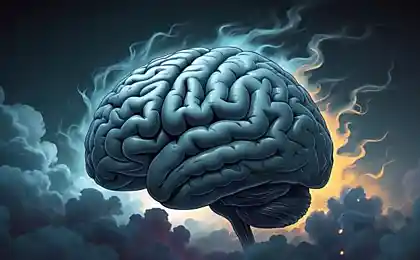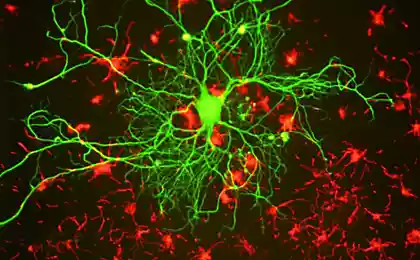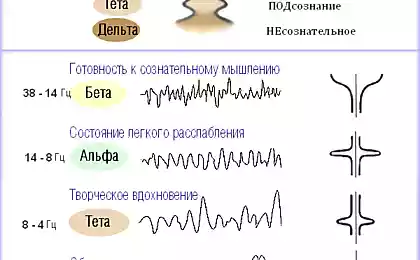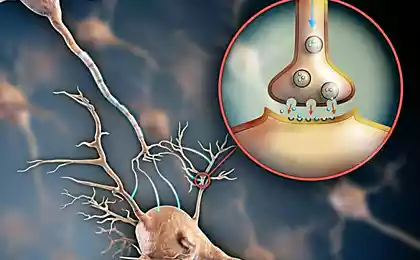613
The most stupid myths and exposing their facts about the brain
Many of our articles are devoted to facts about the brain, but do not forget that the myths on this subject is still very much. Editorial decided to debunk some of them. 1. The more, the better h2> IQ level does not depend on brain size, otherwise we would today be in bondage to whales. It does not depend on it and the percentage ratio of brain to body mass. In humans it is 2%, and shrews, which have never been seen in a special intelligence, as much as 10%. Evolving our brains to increase in size, and more importantly, increased its complexity. In the human brain by 19 to 23 millions of neurons, and they can communicate with each other tens of thousands of times.
2. Right-hand against left-handed h2> For a long time it was believed that a person prevails for some one hemisphere of the brain. Creative individuals - "right-handed" and the logic - "left-handed". Involuntary author of the myth can be considered a neurobiologist Roger Sperry, who wrote an article about the cognitive differences between hemispheres. Sperry said repeatedly that he feared that his ideas can be misinterpreted by journalists, that, in fact, happened.
3. The efficiency of the brain h2> You probably have heard that we use on average only 10% of the brain. Psychics, mediums, and other fortune-teller claimed that the remaining 90% are used to communicate with the supernatural.
4. Aging impairs h2> brain, of course, some truth there. Aging of the brain leads to the destruction of neural connections, which in turn leads to a deterioration in working memory, attention and motor coordination. But other skills over the years, only improved. These scholars include social and emotional.
5. Classical music makes smarter h2> Nothing of the sort. Scientists have proved that classical music has no effect on your intelligence, as previously thought.
6. Crosswords are useful h2> It was believed that solving crossword puzzles and crossword puzzles, we keep your brain in good shape. Scientists at the Institute of Gerontology, in New York, have shown that the brains of people who are fond of crossword puzzles, is getting older in the same way as people who are not involved in this case.
7. Men are given better math than women h2> It is a common opinion - nothing more than a stereotype, is not due to natural inclinations, and culture-differences. Nevertheless, the analysis of the average score on the exact sciences in schools of different countries about the same for boys and girls.
8. Brain cells can not be restored h2> It was long thought that the brain - the only organ in the human body, which cells do not regenerate, but scientists from the Institute in La Jolla (CA) denied the report in 1998. In addition, the brain can adapt to different emergencies. In people who have lost eyesight, acute hearing, so the brain sends more power to the sense organ, and people who have experienced amputation of parts of the brain continue to live as if nothing had happened, as the other parts of the brain take over the lost.
1. The more, the better h2> IQ level does not depend on brain size, otherwise we would today be in bondage to whales. It does not depend on it and the percentage ratio of brain to body mass. In humans it is 2%, and shrews, which have never been seen in a special intelligence, as much as 10%. Evolving our brains to increase in size, and more importantly, increased its complexity. In the human brain by 19 to 23 millions of neurons, and they can communicate with each other tens of thousands of times.
2. Right-hand against left-handed h2> For a long time it was believed that a person prevails for some one hemisphere of the brain. Creative individuals - "right-handed" and the logic - "left-handed". Involuntary author of the myth can be considered a neurobiologist Roger Sperry, who wrote an article about the cognitive differences between hemispheres. Sperry said repeatedly that he feared that his ideas can be misinterpreted by journalists, that, in fact, happened.
Some activities involve one of the hemispheres is stronger, but still use both. An exception can be regarded as people who passed hemispherectomy surgery - removal of one hemisphere of the brain. Such operations are used in some cases of epilepsy and do not entail any cognitive disorders in patients.
3. The efficiency of the brain h2> You probably have heard that we use on average only 10% of the brain. Psychics, mediums, and other fortune-teller claimed that the remaining 90% are used to communicate with the supernatural.
The concept of 10% rejects at least the fact that in order to perform simple actions: walk, eat, sleep, or to vote in the elections, we need to simultaneously use a variety of areas of the brain. So we can not just pick up and become more intelligent by 90%.
4. Aging impairs h2> brain, of course, some truth there. Aging of the brain leads to the destruction of neural connections, which in turn leads to a deterioration in working memory, attention and motor coordination. But other skills over the years, only improved. These scholars include social and emotional.
Studies also show that older people are much richer vocabulary than young, and they are better than they are (but often just to tell that the youngest, what they think about their music and clothes). Over the years, people gain experience that allows him to better solve problems, using what scientists call "behavioral pattern", and all other - worldly wisdom
.
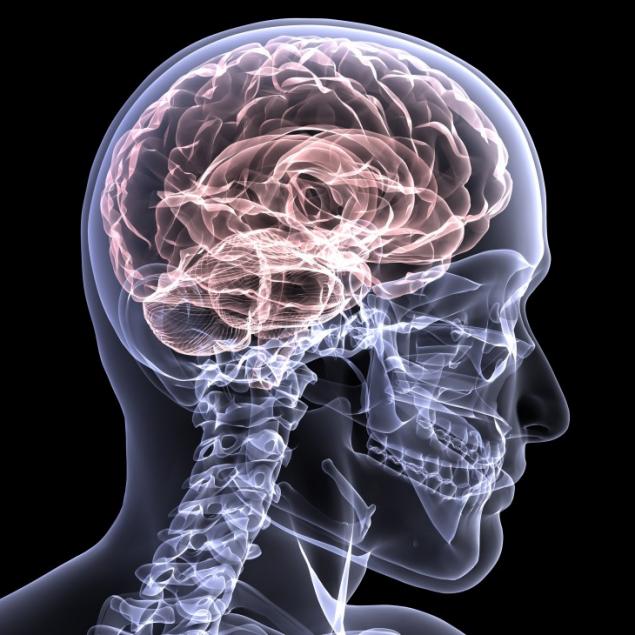
5. Classical music makes smarter h2> Nothing of the sort. Scientists have proved that classical music has no effect on your intelligence, as previously thought.
However, the study of 1993, proved that listening to Mozart improves spatial thinking, but it only for 15 minutes. But even this modest effect might be overestimated, since none of repeated research scientist was unable to obtain similar results. So the only good reason to listen to classical music -. It if you really like
6. Crosswords are useful h2> It was believed that solving crossword puzzles and crossword puzzles, we keep your brain in good shape. Scientists at the Institute of Gerontology, in New York, have shown that the brains of people who are fond of crossword puzzles, is getting older in the same way as people who are not involved in this case.
7. Men are given better math than women h2> It is a common opinion - nothing more than a stereotype, is not due to natural inclinations, and culture-differences. Nevertheless, the analysis of the average score on the exact sciences in schools of different countries about the same for boys and girls.
8. Brain cells can not be restored h2> It was long thought that the brain - the only organ in the human body, which cells do not regenerate, but scientists from the Institute in La Jolla (CA) denied the report in 1998. In addition, the brain can adapt to different emergencies. In people who have lost eyesight, acute hearing, so the brain sends more power to the sense organ, and people who have experienced amputation of parts of the brain continue to live as if nothing had happened, as the other parts of the brain take over the lost.
via ya-zhenschina.com/zhurnal-maxim/37670-8-samyh-populyarnyh-mifov-o-mozge-i-ih-razoblachenie.html
5 surprising facts about the appearance of "Kerchieves" and "Minesweeper"
As life changes when there is a dog in the house




